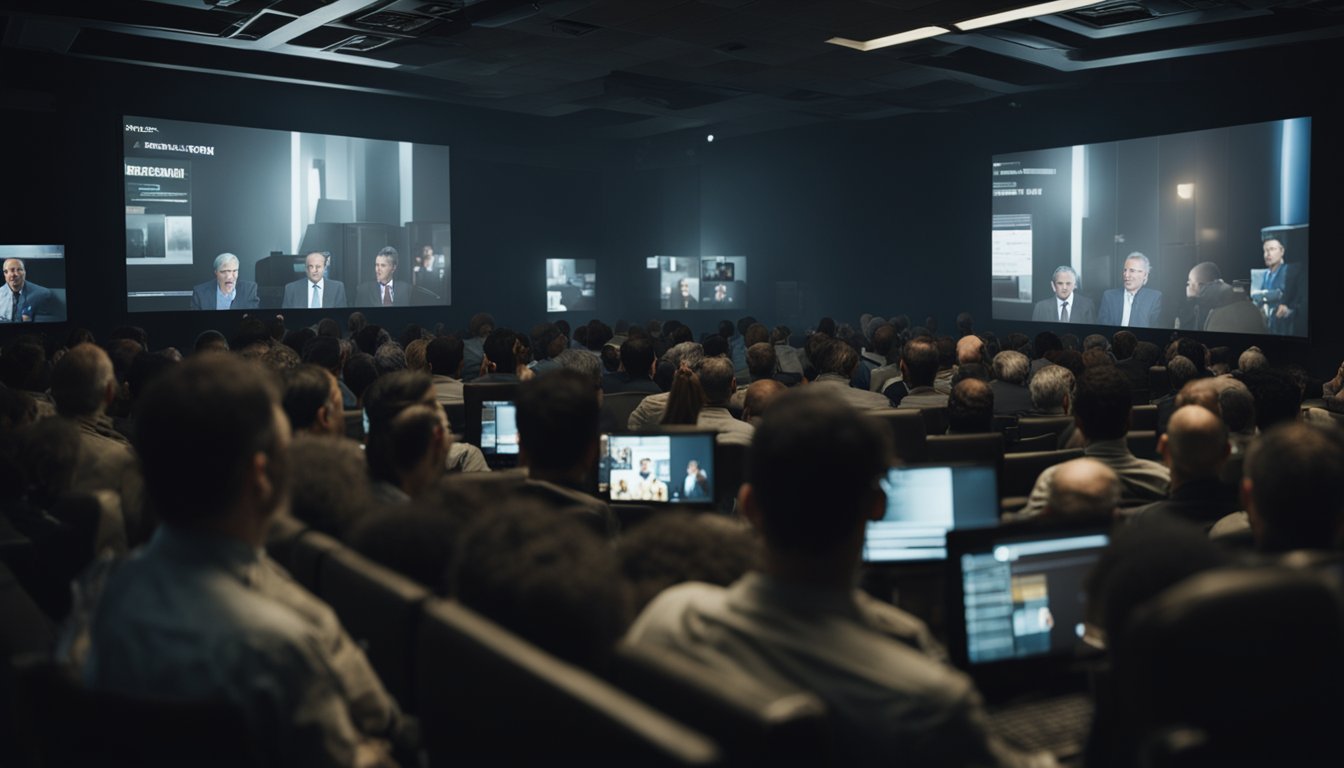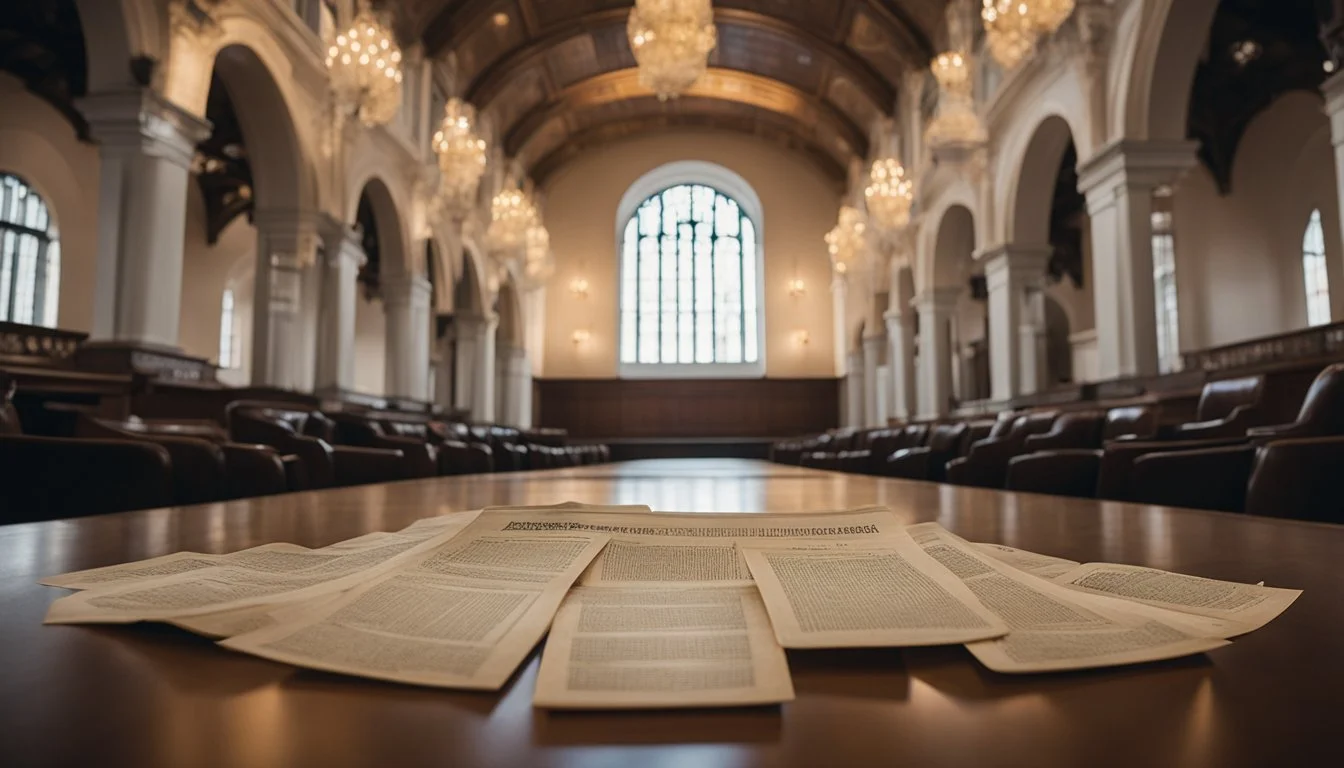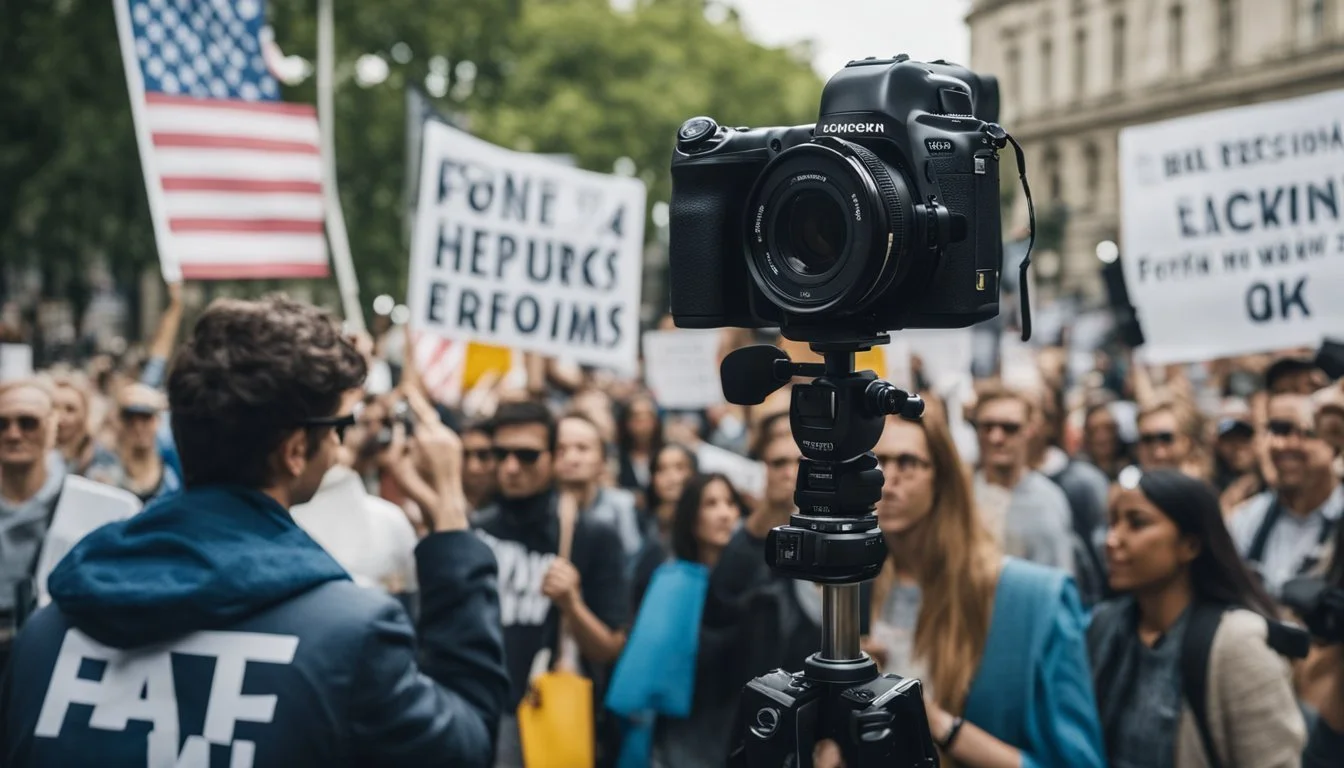12 Documentaries on Political Reforms
Essential Viewing for Understanding Change
Political reforms have long shaped the landscape of societies around the world. Documentaries focusing on these changes provide valuable insights into the mechanisms and impacts of policy shifts, often highlighting the stories behind the statistics and legislative texts.
These documentaries serve as a crucial resource for understanding the complexities of governance and the ongoing struggles for justice and equity. By watching these films, viewers can gain a deeper appreciation of both the historical and contemporary efforts to reform political systems and improve lives globally.
1) 'The Square' directed by Jehane Noujaim (2013)
'The Square' is a powerful documentary film by Jehane Noujaim. It captures the Egyptian Crisis, beginning with the Egyptian Revolution of 2011 at Tahrir Square. The film takes a close look at the political upheaval and the key figures involved in the movement.
Jehane Noujaim follows a group of young revolutionaries as they navigate the turbulent political landscape. The documentary provides an intimate perspective on the struggles and aspirations of these activists. It combines footage from the ground with personal stories to give viewers an inside look at the revolution.
The film was well-received and garnered numerous accolades. It was nominated for the Academy Award for Best Documentary Feature. Additionally, it won three Emmy Awards, highlighting its impact and excellence.
'The Square' is noted for its raw and unfiltered portrayal of events. It depicts the intensity of the protests and the resilience of the Egyptian people. The film is primarily in Arabic, with sections in English, making it accessible to a broad audience.
For more information, visit The Square on Wikipedia.
2) '13th' directed by Ava DuVernay (2016)
'13th' is a documentary film directed by Ava DuVernay that focuses on the intersection of race, justice, and mass incarceration in the United States. Released in 2016, the film takes its name from the Thirteenth Amendment to the United States Constitution, which abolished slavery, except as punishment for a crime.
The documentary explores how this exception clause led to the criminalization of African Americans and the growth of the prison-industrial complex. It argues that modern mass incarceration is a continuation of racial discrimination and control.
Through interviews with scholars, activists, and politicians, the documentary provides a comprehensive examination of the historical and social forces that have shaped the American criminal justice system. The film is both informative and thought-provoking, urging viewers to consider the lasting impact of systemic racism.
For more information on '13th', visit Wikipedia.
3) 'Citizenfour' directed by Laura Poitras (2014)
Laura Poitras' 'Citizenfour' is a pivotal documentary that chronicles Edward Snowden's revelations about mass surveillance carried out by the National Security Agency (NSA). The film captures Snowden's decision to go public with classified information and his interactions with journalists Glenn Greenwald and Ewen MacAskill.
The documentary unfolds in a Hong Kong hotel room, where Snowden provides a detailed account of the NSA's extensive surveillance programs. This direct access to Snowden as events transpire offers an unprecedented look into his motivations and the implications of his disclosures.
'Citizenfour' highlights the intricate dynamics between journalists and whistleblowers. Poitras masterfully uses real-time footage to immerse viewers in the tension and gravity of the situation.
The film has received critical acclaim for its gripping narrative and insightful depiction of one of the most significant leaks in intelligence history. For more information on 'Citizenfour', visit Wikipedia or IMDb.
4) 'Winter on Fire: Ukraine's Fight for Freedom' directed by Evgeny Afineevsky (2015)
"Winter on Fire: Ukraine's Fight for Freedom" is a documentary directed by Evgeny Afineevsky. It chronicles the Euromaidan protests in Ukraine from November 21, 2013, to February 23, 2014. This period marked a significant political upheaval as peaceful student demonstrations evolved into a full-scale revolution.
The film captures the intensity of the protests, showing how the movement for European integration clashed with government forces. It includes compelling footage of protesters enduring harsh responses from the state and highlights the resilience and solidarity among Ukrainians.
Through interviews and firsthand accounts, the documentary offers insights into the diverse motivations and experiences of the demonstrators. It emphasizes themes of democratic aspirations and the desire for a government that reflects the people's will.
The documentary has been praised for its authentic portrayal of events and the filmmaker's ability to convey the emotional weight of the revolution. It is available for streaming on Netflix and provides a dramatic visual and emotional narrative of Ukraine's fight for freedom.
5) 'The Act of Killing' directed by Joshua Oppenheimer (2012)
'The Act of Killing' is a groundbreaking documentary that takes an unconventional approach to exploring the Indonesian mass killings of 1965-66. Directed by Joshua Oppenheimer, along with Christine Cynn and an anonymous Indonesian co-director, the film challenges the former death squad leaders to reenact their crimes in various cinematic genres.
This experimental format provides a unique and disturbing insight into the psychology of the perpetrators. The film records their boastful and often surreal reenactments, revealing both their lack of remorse and the deep trauma underlying their actions.
The mass killings were part of an anti-communist purge that resulted in the deaths of over a million people. Suspected communists, ethnic Chinese, and intellectuals were among the victims. The killers not only escaped justice but were celebrated as national heroes, which the film critically examines.
Oppenheimer's documentary is particularly powerful because it does not rely on traditional methods of storytelling, such as interviews with survivors or historians. Instead, it places the perpetrators' narratives at the center, resulting in a chilling and thought-provoking experience.
For more information on 'The Act of Killing,' visit Wikipedia or IMDb.
6) 'Requiem for the American Dream' with Noam Chomsky (2015)
'Requiem for the American Dream' presents an in-depth analysis by Noam Chomsky, renowned political activist and linguist. The film is based on interviews conducted over four years, where Chomsky examines how wealth and power have become increasingly concentrated in the hands of a few.
Chomsky elaborates on ten principles that have led to this concentration of wealth and power. These principles highlight the systemic inequalities perpetuated by corporate political influence and neoliberal policies, contributing to the economic disparity in America.
The documentary offers a clear and concise overview of these complex issues, making Chomsky's insights accessible to a wider audience. It emphasizes the impact of economic inequality on the American middle class and the democratic process.
Directed by Peter D. Hutchison, Kelly Nyks, and Jared P. Scott, the film is a critical resource for anyone interested in understanding the dynamics of power in U.S. politics. It encourages viewers to reflect on the societal implications of concentrated wealth and the erosion of democratic values.
For more information, visit IMDb.
7) 'The Fog of War' directed by Errol Morris (2003)
"The Fog of War," released in 2003, is a compelling documentary directed by Errol Morris. The film focuses on the life and decisions of Robert S. McNamara, who served as U.S. Secretary of Defense during the Vietnam War under Presidents John F. Kennedy and Lyndon B. Johnson.
This documentary features McNamara's reflections on his actions and policies, offering an in-depth look at modern warfare. It illustrates his insights through eleven lessons derived from his experiences, making it invaluable for those interested in political and military history.
The film also benefits from a haunting original score by composer Philip Glass. This enhances the narrative, underscoring the serious and contemplative tone of McNamara's revelations.
For more information, visit the Wikipedia page on 'The Fog of War'.
8) 'An Inconvenient Truth' with Al Gore (2006)
'An Inconvenient Truth' is a powerful 2006 documentary film directed by Davis Guggenheim. It features former United States Vice President Al Gore and his campaign to educate the public about the dangers of global warming.
The documentary is notable for its comprehensive slide show presentation, which Gore used to inform audiences around the world. The content of the film effectively raised awareness of climate change.
Al Gore's efforts to bring the issue to the forefront through this documentary played a significant role in public discourse on environmental policies. The film also spotlights possible solutions to combat global warming.
'An Inconvenient Truth' helped to shape discussions on climate change, making it a pivotal documentary in the realm of political reforms related to the environment.
More information about the film can be found on Wikipedia.
9) 'Inside Job' directed by Charles Ferguson (2010)
"Inside Job," directed by Charles Ferguson, is a documentary that scrutinizes the 2008 global financial crisis. The film meticulously details the systemic flaws and corruption within financial institutions.
The documentary highlights conflicts of interest and regulatory failures that contributed to the meltdown. Key figures in the finance sector are interviewed, providing insights into the crisis.
Charles Ferguson began researching "Inside Job" in 2008, delving deeply into the economic mechanisms and policy decisions that led to the crisis.
The film is narrated by Matt Damon and has been critically acclaimed for its detailed and informative approach. "Inside Job" brings to light the extent of corruption and its far-reaching consequences.
For more information on 'Inside Job,' visit its Wikipedia page or its IMDb page.
10) 'The War Room' directed by D.A. Pennebaker and Chris Hegedus (1993)
'The War Room', directed by D.A. Pennebaker and Chris Hegedus, is a documentary that offers an inside look at Bill Clinton's 1992 presidential campaign. This film captures the high-energy, behind-the-scenes dynamics of the team that helped Clinton secure the presidency.
The title is a reference to the campaign center in Little Rock, Arkansas, where much of the strategy was formulated. The documentary provides rare insights into political campaign management.
Central figures in the film include James Carville and George Stephanopoulos, who played crucial roles in navigating the campaign through various challenges. Their strategies and interactions are focal points of the documentary.
Pennebaker and Hegedus secured unprecedented access to the campaign's inner workings, allowing them to document nearly 35 hours of footage. This access provides a raw, unfiltered look at political strategy in action.
'The War Room' remains a significant piece of Direct Cinema, a style characterized by unobtrusive filming techniques and a focus on real events as they unfold. It has been widely celebrated for its candid portrayal of political life.
For more information, you can visit IMDb.
11) 'The Invisible War' directed by Kirby Dick (2012)
'The Invisible War,' directed by Kirby Dick, is a documentary that investigates the epidemic of rape and sexual assault within the United States military.
The film brings to light the stories of multiple survivors, providing a platform for their voices and experiences.
Directed by Kirby Dick, a filmmaker known for tackling challenging social issues, 'The Invisible War' gained significant attention upon its release.
The documentary premiered at the 2012 Sundance Film Festival and received the U.S. Documentary Audience Award. It has been praised for its role in influencing policymakers and raising public awareness about a critical issue within the military.
The film's impact extends beyond mere storytelling; it has been instrumental in pushing for legislative changes and reforms within the military justice system.
For more information about 'The Invisible War,' visit IMDb.
12) 'The Corporation' directed by Mark Achbar and Jennifer Abbott (2003)
"The Corporation" is a 2003 Canadian documentary that critically examines the modern corporation. The film is directed by Mark Achbar and Jennifer Abbott, and written by law professor Joel Bakan along with filmmaker Harold Crooks.
The documentary originates from Bakan's book "The Corporation: The Pathological Pursuit of Profit and Power." It provides an in-depth look at various aspects of corporations, including their legal status, ethics, and impact on society.
Featuring interviews with CEOs, whistle-blowers, brokers, and industry experts, the film takes viewers on a journey into the structure and functioning of corporate entities. It uncovers the historical evolution and current dominance of corporations in the global economy.
The film uses a mix of graphic content and engaging narratives to present its arguments, making it accessible to a wide audience. It aims to prompt critical thinking about corporate power and its implications for democracy and economic fairness.
For more information, visit The Corporation on IMDb.
Historical Context of Political Reforms
Political reforms have shaped societies by addressing injustices and promoting equality. These reforms have often emerged from grassroots movements demanding systemic change.
Early Reform Movements
In the 19th century, populist and progressive movements sought to combat corruption and inequality. The Progressive Era, from the 1890s to the 1920s, focused on improving living and working conditions, bettering public education, and expanding voting rights.
Activists like Susan B. Anthony and W.E.B. Du Bois played key roles. The labor movement, advocating for workers' rights, led to regulations on working hours and child labor bans. Civic organizations also emerged, demanding transparency and accountability from government officials.
Key Legislative Changes
Significant legislative changes have marked political reforms. The 19th Amendment in 1920 granted women the right to vote, transforming American politics.
Later, the Civil Rights Act of 1964 outlawed discrimination based on race, color, religion, sex, or national origin. This act was pivotal in dismantling segregation.
The Voting Rights Act of 1965 further ensured that discriminatory practices, particularly in the South, did not hinder African Americans' right to vote. These laws showcased a clear shift towards a more inclusive and equitable society, driven by persistent activism and legal battles.
Impact of Political Reforms
Political reforms can significantly influence both societal norms and economic stability. Understanding these impacts helps to gauge the effectiveness and necessity of legislative changes.
Social Implications
Political reforms often lead to substantial social changes. For example, the Federal Election Campaign Act Amendments of 1974, spurred by the Watergate scandal, enhanced transparency in political campaign financing. This improved public trust in electoral processes. Another illustration is the Boland Amendment following the Iran-Contra affair, which aimed to limit unauthorized government support, fostering a culture of accountability within the U.S. government.
Reforms also promote civil rights advancements. For instance, legalizing same-sex marriage has led to greater social acceptance and legal recognition for LGBTQ+ communities. Additionally, education policy reforms frequently aim to address disparities, enabling equal access to quality education and thus, promoting social equity.
Economic Outcomes
The economic outcomes of political reforms can be both immediate and long-lasting. For instance, campaign finance reforms have indirectly influenced economic policies by reducing the sway of corporate donations, thus encouraging policymaking in the public interest over private gains. The Dodd-Frank Act, introduced after the 2008 financial crisis, aimed to overhaul the US financial system, bringing stricter regulations to prevent future economic downturns.
Trade policy reforms have also played significant roles. Trade agreements like NAFTA have reshaped national economies by adjusting tariffs and imports, often boosting economic growth and employment rates. Similarly, labor reforms focused on wage laws and working conditions have improved the economic well-being of the workforce, thereby stimulating broader economic advancement.
Analyzing Documentary Filmmaking Techniques
Documentary filmmaking techniques have a substantial impact on how political reforms are presented and perceived. Key methods include various narrative styles and the strategic use of archival footage.
Narrative Styles
Narrative styles in documentaries on political reforms vary considerably. Some employ expository narratives, which directly address the viewer, often with a narrator guiding the story. Observational documentaries provide an unfiltered, fly-on-the-wall perspective, allowing viewers to draw their conclusions.
Participatory documentaries feature filmmakers interacting with subjects, influencing the narrative directly. Reflective and performative styles go further, emphasizing the filmmaker's presence and their subjective view on the topic. Each style offers a unique lens through which political reforms are explored, highlighting different aspects and engaging the audience in distinct ways.
Use of Archival Footage
Archival footage serves as critical evidence in documentaries, reinforcing historical context and illustrating past events related to political reforms. Filmmakers meticulously select clips from news broadcasts, speeches, and personal recordings to support their narrative.
The use of archival footage can lend authenticity and depth, creating an immersive experience. Editing techniques, including juxtaposition and montage, are often employed to convey complex political changes and their impacts. This method not only grounds the documentary in reality but also bridges the gap between past and present reforms.








